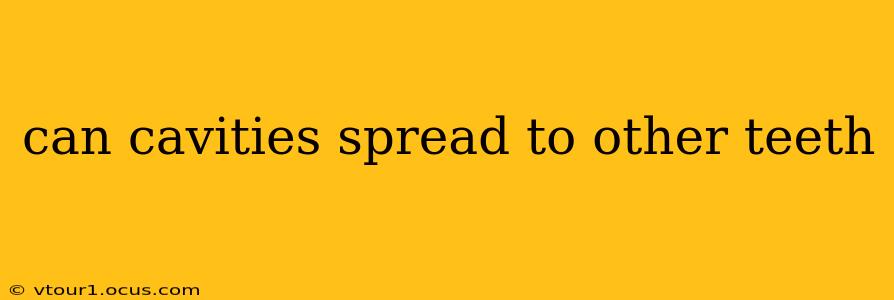Dental cavities, or caries, are a common problem caused by bacteria that erode tooth enamel. A natural question many people ask is whether these cavities can spread to other teeth. The short answer is: no, cavities themselves don't spread directly from one tooth to another. However, the underlying cause – harmful oral bacteria – can spread, increasing the risk of new cavities developing in other teeth. This article will delve deeper into the process, answering frequently asked questions about cavity transmission and prevention.
What causes cavities?
Cavities develop when bacteria in the mouth produce acids that attack tooth enamel. These acids are byproducts of the bacteria metabolizing sugars and starches from food and drinks. Over time, this acid attack weakens the enamel, creating a cavity. The bacteria responsible, primarily Streptococcus mutans and Lactobacillus, thrive in a biofilm called plaque that accumulates on teeth.
Can bacteria from one cavity infect other teeth?
While cavities themselves don't spread, the bacteria that cause them certainly can. Plaque, the sticky film that harbors these bacteria, isn't confined to a single tooth. It can spread easily throughout the mouth, coating all tooth surfaces. If you have a cavity on one tooth, the bacteria responsible are likely present in your mouth and can contribute to the development of new cavities on other teeth. This is why consistent oral hygiene is crucial.
How can I prevent cavities from spreading?
The most effective way to prevent new cavities from forming, even if you already have one, is through diligent oral hygiene. This includes:
- Brushing: Brush your teeth twice a day for at least two minutes each time, using fluoride toothpaste. Proper brushing technique is crucial to remove plaque effectively from all tooth surfaces.
- Flossing: Flossing daily removes plaque and food particles from between teeth and along the gumline—areas your toothbrush can't reach.
- Regular Dental Checkups: Professional cleanings remove plaque and tartar (hardened plaque) that you can't remove at home. Your dentist can also detect cavities early, when they're easier and less expensive to treat.
- Dietary Habits: Limiting sugary and starchy foods and drinks reduces the food source for cavity-causing bacteria. Drinking plenty of water also helps to rinse away food particles and neutralize acids.
Can a cavity cause pain in other teeth?
No, a cavity itself doesn't directly cause pain in other teeth. However, extensive tooth decay or an infection spreading from a cavity can sometimes cause referred pain. This pain might feel like it's originating from a different tooth or area of the jaw, making it difficult to pinpoint the source. If you experience unexplained tooth pain, it's essential to consult your dentist for a proper diagnosis.
Do I need to treat a cavity immediately to prevent it from spreading?
While cavities don't spread directly, treating existing cavities is crucial to prevent further decay and potential complications like tooth abscesses. Untreated cavities can worsen, requiring more extensive and potentially costly treatment. Early detection and treatment are key to protecting your oral health.
Can fillings prevent cavities from spreading?
Fillings are used to repair existing cavities by removing the decayed portion of the tooth and replacing it with a filling material. This prevents further decay in that specific tooth. However, fillings don't prevent the spread of bacteria throughout the mouth. Therefore, maintaining good oral hygiene practices remains essential to prevent new cavities from developing in other teeth.
In conclusion, cavities themselves don't spread, but the bacteria that cause them can colonize other areas of the mouth, increasing the risk of new cavities. Maintaining excellent oral hygiene habits, including brushing, flossing, and regular dental visits, is the best defense against cavity development and progression. If you have any concerns about cavities or your oral health, consult your dentist for personalized advice and treatment.
